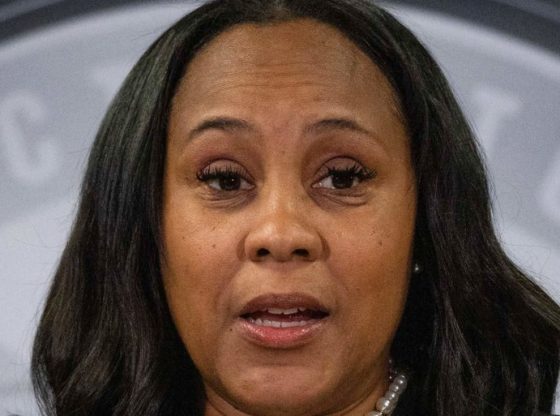Fulton County District Attorney Fani Willis could still face serious consequences — including disbarment — after a judge declined to outright disqualify her from the case against former President Donald Trump.
Though Judge Scott McAfee ruled Willis could stay on the case if Nathan Wade leaves, he expressed clear disapproval of her behavior and cast doubt on whether she had testified truthfully about their relationship, hinting there may be consequences yet to come from other places. Multiple other authorities, including the Georgia State Ethics Commission and state Senate, have active investigations into Willis related to her conduct.
“This finding is by no means an indication that the Court condones this tremendous lapse in judgment or the unprofessional manner of the District Attorney’s testimony during the evidentiary hearing,” McAfee wrote. “Rather, it is the undersigned’s opinion that Georgia law does not permit the finding of an actual conflict for simply making bad choices – even repeatedly – and it is the trial court’s duty to confine itself to the relevant issues and applicable law properly brought before it.”
“Other forums or sources of authority such as the General Assembly, the Georgia State Ethics Commission, the State Bar of Georgia, the Fulton County Board of Commissioners, or the voters of Fulton County may offer feedback on any unanswered questions that linger,” he wrote.
Atlanta-based defense attorney Andrew Fleischman noted that McAfee “strongly implied that [Willis’] testimony about when the relationship began was not credible.”
“That could theoretically be the basis for disciplinary action,” he told the Daily Caller News Foundation. “In practice, though, prosecutors are almost never disciplined by the state bar.”
Willis and Wade asserted that their relationship began in 2022, despite Willis’ long-time friend Robin Yeartie testifying it began in 2019 and texts revealing Wade’s former law partner Terrence Bradely told a defense attorney the relationship started before Wade was hired. Under oath, Wade also stood by interrogatories filed in his divorce case claiming he did not entertain or have relations with a member of the opposite sex during the course of his marriage.
“Wade’s patently unpersuasive explanation for the inaccurate interrogatories he submitted in his pending divorce indicates a willingness on his part to wrongly conceal his relationship with the District Attorney,” McAfee wrote.
Will Chamberlain, Article III Project senior counsel, said the ruling is a “a giant flag” telling the Georgia Bar and attorney general’s office to investigate Willis.
“It is non-trivial for a judge to find that there are ‘reasonable questions’ about whether a DA testified untruthfully in a formal opinion,” Chamberlain wrote on X.
Multiple other investigations into Willis are already in progress.
Earlier this month, the newly formed Georgia Senate Special Committee on Investigations subpoenaed Ashleigh Merchant, the defense attorney who filed the initial bombshell motion to disqualify Willis, to testify. The committee, whose purpose is to “thoroughly investigate the allegations of misconduct” by Fani Willis, does not have the power to discipline her but can issue subpoenas and recommend legislation.
Republican Gov. Brian Kemp also signed legislation Wednesday that will allow the Prosecuting Attorneys Qualifications Commission, which does have the power to discipline and remove prosecutors, to move forward. Though the bill was not specifically targeted at Willis, it could be used to open an investigation into her, according to Fox 5 Atlanta.
The Fulton County Board of Ethics declined last week to review two complaints against Willis at a scheduled meeting, kicking the issue to the state ethics commission. A spokesperson for the Georgia State Ethics Commission, which deals with campaign finance matters, told the DCNF there are three “open and active cases” that have been filed against third parties against Willis, as well as one against Wade.
“The cases are all under active investigation, and therefore we’ve made no determination one way or the other at this point as to the merits,” the spokesperson said. “Those decisions will be made upon the conclusion of the investigation into each case, respectively.”
One complaint, filed by Republican Georgia Rep. Marjorie Taylor Greene, centers on Willis’ failure to abide by financial disclosure requirements under the Georgia Campaign Finance Act.
Willis failed to include gifts from Wade on her 2022 financial disclosure as required under the Fulton County Code of Ethics, the DCNF previously reported.
Amid state investigations, House Judiciary Chair Jim Jordan likewise threatened Thursday to hold Fani Willis in contempt if she does not comply with the subpoena issued by the committee in February to request records relating to her potential misuse of federal funds. Willis previously failed to accept the subpoena over email, requiring the U.S. Marshals Service to hand-deliver it.
George Washington University law professor Jonathan Turley wrote Friday that the ruling means Willis will have to lead the case “carrying more baggage than Amtrak.”
“She will also have to deal with the investigation by the state senate and could face bar proceedings with Wade,” he wrote on X. “Indeed, Wade could face questions over his alleged false statements in the divorce case where Willis would be a witness.”
Katelynn Richardson on March 15, 2024












